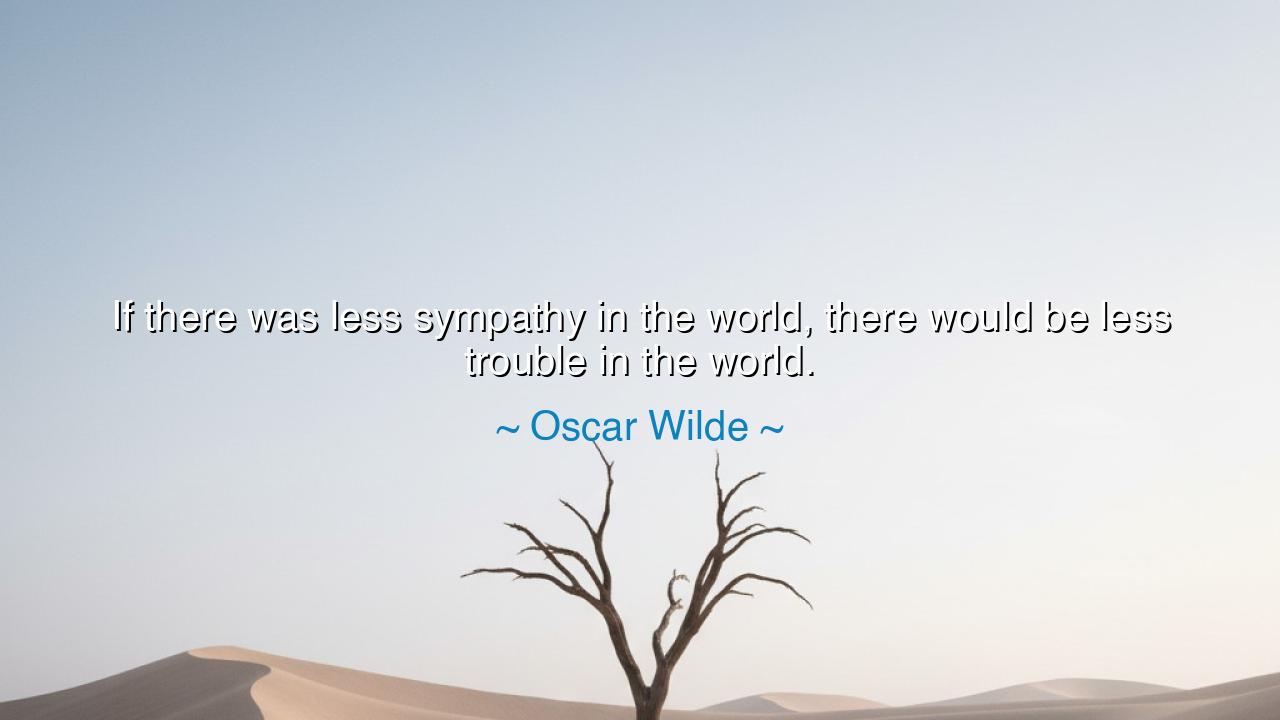
If there was less sympathy in the world, there would be less






"If there was less sympathy in the world, there would be less trouble in the world." These words by Oscar Wilde are both provocative and profound. In a world that often lauds compassion and empathy, Wilde dares to question whether sympathy—while seemingly virtuous—may, in fact, contribute to some of the struggles we face. His argument, at first glance, might seem counterintuitive. After all, sympathy is often considered a noble virtue. But Wilde’s statement suggests that too much emotional engagement in the struggles of others can sometimes perpetuate trouble, leading us away from reason and action.
In the ancient world, the notion of sympathy was a double-edged sword. The great Greek philosophers often warned against emotions overtaking rational thought. Plato, for instance, in his dialogues, cautioned against allowing one's emotions to cloud judgment, especially in the context of leadership. The Greeks believed that while sympathy could bind communities together, it could also lead to irrational decisions driven by unchecked emotion. The emotions stirred by too much sympathy could cloud objectivity and lead to unnecessary conflict. To act from sympathy without wisdom could perpetuate cycles of suffering, instead of resolving them.
Consider the story of King Oedipus, a tragic hero from Greek mythology. Oedipus, in his deep sympathy for his people, made rash decisions that ultimately led to the downfall of his kingdom. His compassion for his people, though noble, clouded his ability to see the truth, and his actions—driven by emotional responses—set in motion a series of tragic events. This myth underscores the danger of allowing sympathy to dominate one’s actions, rather than a measured, thoughtful response. Oedipus’ tragedy is a stark reminder that excessive emotional engagement without clear thinking can cause more harm than good.
Wilde’s perspective becomes even more poignant when we reflect on the historical examples of leaders who acted out of a misguided sense of sympathy, often leading to greater strife. Take, for instance, the French Revolution. In the fervor of sympathy for the oppressed, revolutionaries overthrew the monarchy, but the emotional and impulsive nature of their actions led to the Reign of Terror—a period marked by violence and mass executions. The sympathy for the people’s suffering, unchecked by thoughtful governance, caused a wave of further destruction. Wilde’s insight serves as a warning: while sympathy can inspire change, if not tempered with wisdom and caution, it can fuel chaos.
Yet, Wilde’s statement is not an attack on empathy or kindness, but rather a critique of excessive emotional indulgence. The lesson here is that sympathy, though essential to the human experience, should not be the sole guide to action. Rationality, justice, and balance must also play a role in how we approach the suffering of others. Over-identifying with another’s pain can sometimes lead to emotional burnout and irrational reactions. It is essential to engage with the world’s suffering with both an open heart and a clear mind, ensuring that our empathy does not cloud our judgment or propel us into unwise action.
The wisdom of Wilde’s words urges us to practice thoughtful compassion, one that allows us to feel for others, but not at the expense of reason. In our daily lives, we must balance empathy with objectivity, understanding that while it is important to care for others, we must also recognize the limits of our emotional involvement. If we give in to excessive sympathy, we risk becoming overwhelmed by the world's troubles, rather than acting to alleviate them.
In conclusion, Oscar Wilde provides a profound reminder: sympathy, though an essential human quality, must be tempered with wisdom and reason. It is not enough to feel for others’ suffering; we must also act intelligently, with justice and prudence. As we engage with the world’s sorrows, let us ensure that our compassion does not blind us to the practical steps necessary for healing and resolution. By balancing our emotions with clear thinking, we can contribute to a world that is not only empathetic but wise—a world where compassion leads to action, not further turmoil.






AAdministratorAdministrator
Welcome, honored guests. Please leave a comment, we will respond soon